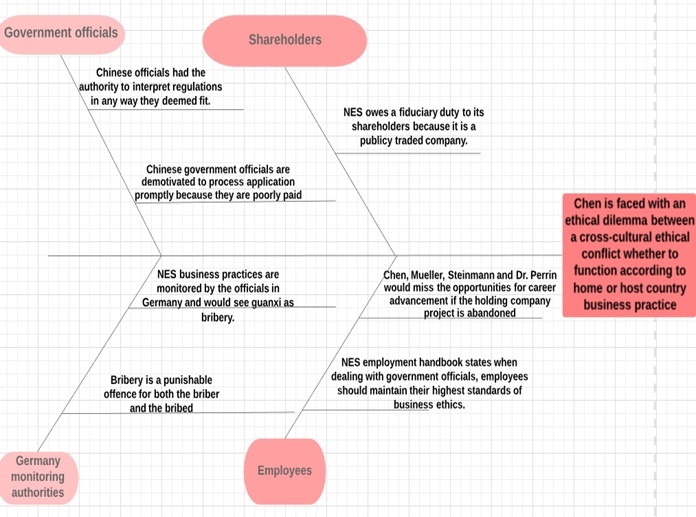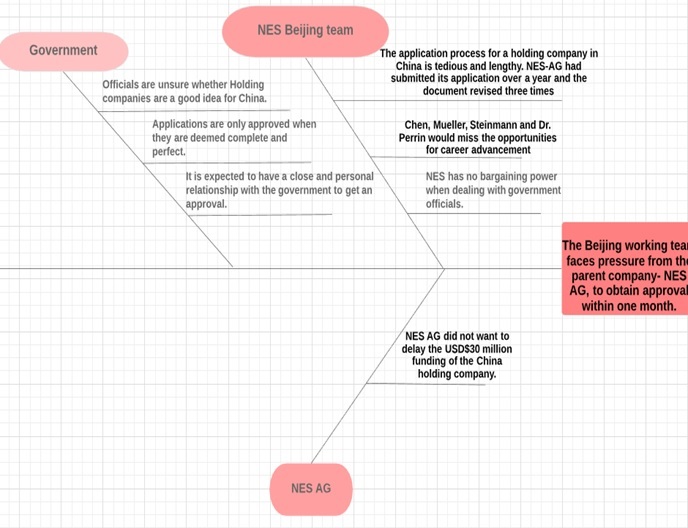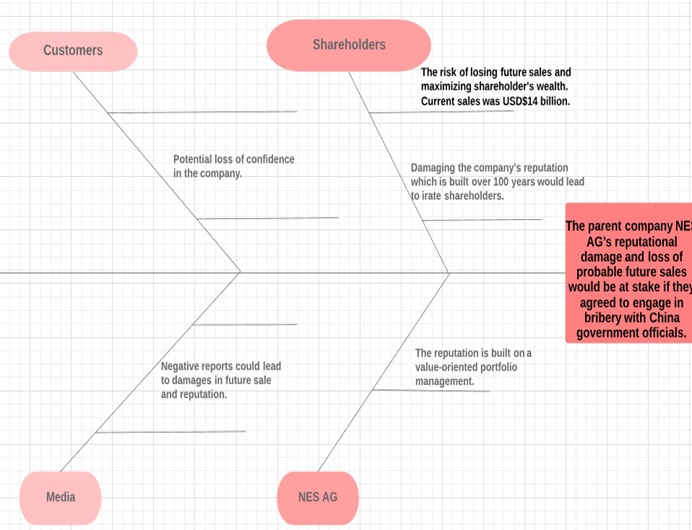Ethics and Stakeholder Management
NES CHINA: BUSINESS ETHICS (A)
Assignment: Ethics and Stakeholder Management
Executive Summary
NES was founded in Germany in 1881 and has grown from a pure tube manufacturer into one of the largest industrial groups in Germany. The company specializes in plants and heavy machinery, automotive systems and components, hydraulic, pneumatic and electrical drives and controls, telecommunications services and production of steel tubes and pipes. The holding company NES AG wants to set up a NES holding company in China to pursue diversification strategies. Representatives were already operating in the Beijing office in China and were given instructions to draft up the application for the holding company and to negotiate with the Chinese government. The representatives were led by Kai Mueller, Jochen Steinmann and Dr. Jean Perrin who would have been the potential president, financial controller and lawyer respectively, in the event the company was established. Due to long negotiation efforts with the government officials, in order to maximize the chances of having the application accepted, the NES team in Beijing hired a Chinese government affairs coordinator – Lin Chen who is accustomed to the Chinese business culture.
The main issue highlighted in the case is Chen is faced with the ethical dilemma between a cross-cultural ethical conflict whether to function according to home or host country business practice. Chen offered to present gifts to government officials to build a relationship and to speed up the application process. The second important issue noted is the Beijing working team faces pressure from the parent company- NES AG, to obtain approval within one. The Beijing working team is required to close the China holding company deal within one month or risk having NES AG abandon the project. The third problem is NES AG’s reputational damage and loss of probable future sales would be at stake if they agreed to engage in bribery with China government officials.
The first suggested alternative and recommendation to remedy the issues identified is: The NES team had to find a broad middle ground and consider strategies to satisfy everybody. Bribery is an illegal and punishable offense in Germany however, Chen can consider grease payments (guanxi) which include giving relatively small payments to officials. Payments should be limited to USD$60. Secondly, in order to proceed with the China Holding Company, NES should develop special ethical codes of conduct to recognize the Chinese business culture. For example, adopting the renquing (social or humanized obligation) and mianzi (the notion of face) which were important to the Chinese way of doing business. Also, building close relationships in order to expedite business deals. Moreover, the Beijing working team should dismiss Lin Chen because she is biased to the Chinese way of doing business. Lastly, the Beijing team should negotiate with NES AG for them to get more time to get their application approved. The team can lobby for 90 days as this is the normal processing time instead of one month. This will allow the team time to develop special ethical codes of conduct to recognize the Chinese business culture.
Identification of Symptoms
- NES wanted to expanded business by forming a holding company and investing in Beijing, China.
- The application process for a holding company in China is tedious and lengthy. NES-AG had submitted its application over a year and the document revised three times.
- The NES team in Beijing hired a Chinese government affairs coordinator – Lin Chen who is accustomed to the Chinese business culture to provide leverage however she was not knowledgeable about Germany business practices.
- China viewed Holding companies as a relatively new form of foreign investment in China and was uncertain whether they are a good idea.
- NES AG did not want to delay the USD$30 million funding of the China holding company. As a result, it demanded that Beijing team obtain approval within one month or they might abandon it.
- Chen, Mueller, Steinmann and Dr. Perrin would miss the opportunities for career advancement if the holding company project is abandoned.
- Chinese government officials are demotivated to process application promptly because they are paid US$200 monthly which is considered to be low income in China.
- Business in China is based more on guanxi where gift giving is the expected normal behavior while in the Western countries it is considered as bribery which is unethical and illegal.
- Government officials in China way of conducting business is based on corruption and bribery.
- NES is at an impasse because its business code of conduct stated how employees should maintain their highest standards of business ethics when dealing with government officials. It further mentioned that NES should avoid any activities that would compromise and lead to unlawful activities.
- NES reputation will be at stake both in China and Germany if the company was to collude with the Chinese government in bribery. NES’s business has been in existence over 100 years now operating in more than 100 countries. There is a probability of a decline in future sales if NES was to conduct in bribery. The company sales in 1997 amounted to USD$14 billion.
- If NES does not open the holding company, they risk losing potential profits that would have been generated by the holding company.
- Opening a holding company in China would give NES more control over employment contracts. The Chinese government placed legal restrictions on the activities of the Beijing Representative Office relating to employment issues including recruitment, compensation and dismissal.
- The prospective president Kai Mueller fell ill in June 1997 and had to return to Germany for treatment which left Steinmann and Dr. Perrin in charge.
- Nes is a publicly traded company and the directors owe a fiduciary duty to shareholders in Germany.
- Chinese officials had the authority to interpret regulations in any way they deemed fit.
Problem Statements
The main issues identified in the case are:
Problem 1- Chen is faced with an ethical dilemma between a cross-cultural ethical conflict whether to function according to home or host country business practice.
- The company is at an impasse, if it should impose the home country’s moral principles or if it should adapt to the local Chinese business practices. An excerpt from NES’s employment handbook stated that employees should always demonstrate the highest standards of business and personal ethics when deal with government officials. It also mentioned that employees are not to solicit, accept, or agree to accept any gift of value whether directly or indirectly from a prospective supplier that the Company does business with. 1
Problem 2- The Beijing working team faces pressure from the parent company- NES AG, to obtain approval within one month.
- The Beijing working team is required to close the China holding company deal within one month or risk having NES AG abandon the project. The deal has been ongoing from early 1997 until February 1998 and NES AG did not want to defer any longer using the registered capital of USD$30 million.
Problem 3- The parent company NES AG’s reputational damage and loss of probable future sales would be at stake if they agreed to engage in bribery with China government officials.
- NES AG implemented value-oriented portfolio management by targeting their financial resources in areas which would be most profitable. The company sales in 1997 amounted to USD$14 billion and there would be a probability of a decline in future potential sales due to reputational damage if the China holding company was to conduct in bribery.
Problem Analysis
Fishbone Analysis 1

Fishbone Analysis 2

Fishbone Analysis 3

Identification of Alternatives
- The NES team had to find a broad middle ground and consider strategies to satisfy everybody. Bribery is an illegal and punishable offense in Germany however, Chen can consider grease payments (guanxi) which include giving relatively small payments to officials. Payments should be limited to USD$60 rather than the USD$360 Mr. Zhu had suggested.
- NES AG should withdraw the application for establishing China Holding Company because of the ethical conflict and business practice in China.
- In order to proceed with the China Holding Company, NES should develop special ethical codes of conduct to recognize the Chinese business culture. For example, adopting the renquing (social or humanized obligation) and mianzi (the notion of face) which were important to the Chinese way of doing business. Also, building close relationships in order to expedite business deals.
- The Beijing working team should dismiss Lin Chen.
- The Beijing team should negotiate with NES AG for them to get more time to get their application approved. The team can lobby for 90 days as this is the normal processing time instead of one month.
Evaluation of Alternatives
1. The NES team had to find a broad middle ground and consider strategies to satisfy everybody. Bribery is an illegal and punishable offense in Germany however, Chen can consider grease payments (guanxi) which include giving relatively small payments to officials. Payments should be limited to USD$60 rather than the USD$360 Mr. Zhu had suggested.
Pros:
- Grease payments are not considered illegal. The amount is relatively small and it will expedite the approval process.
- It will save NES time and money. NES had submitted its application over a year and the document had been revised three times.
- The USD$60 is immaterial and won’t cost the company too much.
Cons:
- There is a fine line between grease payment and bribery. The government officials in Germany might see grease payments as a form of bribery as the suitable payment amount can be subjective.
- Grease payments are morally wrong.
- Grease payments would go against the employment handbook as employees were expected to observe the highest standards of business and personal ethics when dealing with government officials with whom the company transacts. Breach of the company rules could lead to immediate dismissal.
- Chinese government officials might not find grease payments as enough money to influence their decision.
2. NES AG should withdraw the application for establishing China Holding Company because of the ethical conflict and business practice in China.
Pros:
- In retracting the offer, they will be adhering to ant-bribery laws in Germany. The criminal offence would lead to the briber and bribed being punished.
- NES AG would maintain their reputation that they built over the years globally.
- NES AG would save USD$30 million if they do not obtain a business license for establishing the holding company in China.
- NES would save their effort and time by not opening a holding company in China. To open a holding company in China, NES had to submit a project proposal, feasibility study, articles of association and other application documents to the Local Department and then to the Central Department for examination and approval. Approvals are usually issued only when the application is deemed “complete and perfect” however the Central Department can always find some minor issues, lengthening the application process.
Cons:
- By not opening the holding company, NES will forgo potential profits and growth in sales. The business sales in 1997 amounted to US$14 billion.
- NES would continue to operate Beijing Representative Office under China legal restrictions. The Chinese government would continue to control employment contracts and place legal restrictions on activities relating to employment issues -recruitment, compensation and dismissal of Chinese employees.
3. In order to proceed with the China Holding Company, NES should develop special ethical codes of conduct to recognize the Chinese business culture. For example, adopting the renquing (social or humanized obligation) and mianzi (the notion of face) which were important to the Chinese way of doing business. Also, building close relationships in order to expedite business deals.
Pros:
- In return the company will gain efficiency in obtaining approval and flexibility in the interpretation of the wording of documents within the scope permitted by law.
- Conforming to Chinese business practices will improve business relationships between the two countries.
Cons:
- Shareholders and monitoring authorities may see this as morally wrong since the company will be adopting relativism approach. NES established business principle that demonstrated its responsibilities towards not only shareholders, employees and customers but also to its society.
4. The Beijing working team should dismiss Lin Chen.
Pros:
- Chen is biased to the Chinese way of doing business. For example, Chen only sought advice from Mr. Zhu who was equally biased.
- Chen was not knowledgeable about Germany business practices which made her incompetent. Steinmann and Dr. Perrin advised Chen that she needed to learn the Western business rules and values.
- Chen was hired to expedite the application process of the holding company but she is unable to a suitable strategy to satisfy everyone.
- Chen was more concerned about her future career at the holding company.
Cons:
- The Beijing team had one month to close the holding company deal therefore dismissing Chen would not be a good idea.
5. The Beijing team should negotiate with NES AG for them to get more time to get their application approved. The team can lobby for 90 days as this is the normal processing time instead of one month.
Pros:
- This will allow the team time to develop special ethical codes of conduct to recognize the Chinese business culture.
- The business will not forgo establishing the holding company and potential future profits.
Cons:
- There is no guarantee of obtaining an approval for additional time from NES AG.
- There is no certainty that the Chinese officials will grant the business license within the 90 days.
Recommended Assignment of Actions
- The NES team had to find a broad middle ground and consider strategies to satisfy everybody. Bribery is an illegal and punishable offense in Germany however, Chen can consider grease payments (guanxi) which include giving relatively small payments to officials. Payments should be limited to USD$60 rather than the USD$360 Mr. Zhu had suggested. It will save NES time and money considering USD$60 is an insignificant amount and NES had submitted its application over a year with the document being revised three times.
- In order to proceed with the China Holding Company, NES should develop special ethical codes of conduct to recognize the Chinese business culture. For example, adopting the renquing (social or humanized obligation) and mianzi (the notion of face) which were important to the Chinese way of doing business. Also, building close relationships in order to expedite business deals such as inviting officials to dinners and giving gifts. NES should also communicate to the shareholders and monitoring authorities in Germany about the changes in the business principles.
- The Beijing working team should dismiss Lin Chen because she is biased to the Chinese way of doing business. Chen was not knowledgeable about Germany business practices which made her incompetent. Steinmann and Dr. Perrin advised Chen that she needed to learn the Western business rules and values.
- The Beijing team should negotiate with NES AG for them to get more time to get their application approved. The team can lobby for 90 days as this is the normal processing time instead of one month. This will allow the team time to develop special ethical codes of conduct to recognize the Chinese business culture.
Implementation Plan
|
Action and Implementation Plan | |
|
Immediate Actions |
The Beijing team should negotiate with NES AG for them to get more time to get their application approved. The team can lobby for 90 days as this is the normal processing time instead of one month. This will allow the team time to develop special ethical codes of conduct to recognize the Chinese business culture. The |
|
Short Term Actions |
NES team had to find a broad middle ground and consider strategies to satisfy everybody. Payments should be limited to USD$60 rather than the USD$360 Mr. Zhu had suggested. It will save NES time and money considering USD$60 is an insignificant amount and NES had submitted its application over a year with the document being revised three times. |
|
Long Term Actions |
In order to proceed with the China Holding Company, NES should develop special ethical codes of conduct to recognize the Chinese business culture. For example, adopting the renquing (social or humanized obligation) and mianzi (the notion of face) which were important to the Chinese way of doing business. Also, building close relationships in order to expedite business deals such as inviting officials to dinners and giving gifts. NES should also communicate to the shareholders and monitoring authorities in Germany about the changes in the business principles. |
Conclusion
This case clearly indicates the dilemma NES and other multinational company face when there are differences in ethical values. NES is at an impasse if it should adapt to the local Chinese business practices or adhere to Germany business practices. An excerpt from NES’s employment handbook stated that employees should always demonstrate the highest standards of business and personal ethics when dealing with government officials. It also mentioned that employees are not to solicit, accept, or agree to accept any gift of value whether directly or indirectly from a prospective supplier that the Company does business with. NES team had to find a broad middle ground and consider strategies to satisfy everybody.
In order to proceed with the China Holding Company, NES should develop special ethical codes of conduct to recognize the Chinese business culture. For example, adopting the renquing (social or humanized obligation) and mianzi (the notion of face) which were important to the Chinese way of doing business.
References
Excerpt from the employment Handbook of one of the NES’s Enterprises in China.


